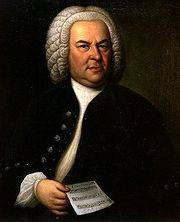
Johann Sebastian Bach Quotations
My guess is that the compositions of Johann Sebastian Bach have been, and continue to be, the most studied and performed pieces by any know composer who has ever lived… at least on planet earth. His legacy, in addition to influencing most all western music performing musicians and composers, may be heard and felt in at least four major arenas:
1. Bach was a virtuoso performing musician on organ and the other keyboard instruments of harpsichord clavichord. As a virtuoso performer on keyboards and an advanced string player, we inherited a vast amount of very challenging and complex music. This technical complexity and sophistication extended to the other instruments and to voice in Bach’s compositions.
2. His body of work in the realm of religious pieces for organ, voice and other instruments continues to be performed in both church and non-liturgical performance settings.
3. His secular pieces for keyboard and many other instruments as solos, duets and for larger orchestral ensembles hold a central place in classical music.
4. He was also a committed music teacher as evidenced by works he composed to give others opportunities to play in lesser-used keys. Examples of works with this focus are demonstrated with the two books of the Well Tempered Clavier, with each piece including both a prelude and a fugue in every major and minor key. Other examples include the Goldberg Variations, which explores varying intervals in the cannons, The Art of Fugue showing a rich variety of fugal techniques and Ann Magdalena’s Notebook, which has helped countless keyboard students, (including me), to learn to play piano.
Image: Portrait of composer, Johann Sebastian Bach
“There is nothing remarkable about it, all one has to do is hit the right keys at the right time and the instrument plays itself.”
“Music is an agreeable harmony for the honor of God and the permissible delights of the soul.”
“My present post amounts to about 700 thaler, and when there are rather more funerals than usual, the fees rise in proportion; but when a healthy wind blows, they fall accordingly…”
– Johann Sebastian Bach (1685 – 1750), Letter to Georg Erdmann, 1732, on his post as Cantor of Leipzig; in “The Bach Reader: A Life of J. S. Bach in Letters and Documents,” by Hans T. David and Arthur Mendel, 1945.
“I have always kept one end in view, namely . . . to conduct a well-regulated church music to the honour of God.”
“Music is an agreeable harmony for the honor of God and the permissible delights of the soul.”
“If I decide to be an idiot, then I’ll be an idiot on my own accord.”
“Where there is devotional music, God is always at hand with His gracious presence.”
“I was obliged to be industrious. Whoever is equally industrious will succeed . . . equally well.”
“My masters are strange folk with very little care for music in them.”
– Johann Sebastian Bach (1685 – 1750)
“Since the best man could not be obtained, mediocre ones would have to be accepted.”
“The immortal god of harmony.”
– Ludwig van Beethoven, 1801
“Too much counterpoint; what is worse, Protestant counterpoint.”
– Thomas Beecham, quoted by Neville Cardus in the Guardian, 1971
“Bach almost persuades me to be a Christian.”
– Roger Fry, quoted in Virginia Woolf, Roger Fry (1940)
“You play Bach your way and I’ll play him his way.”
– Wanda Landowska (1879 – 1959) [who was a pioneer in playing Bach in modern times on a harpsichord]
“Why waste money on psychotherapy when you can listen to the B Minor Mass?”
– Michael Torke (1961- )
“Since the best man could not be obtained, mediocre ones would have to be accepted.”
“The immortal god of harmony.”
– Ludwig van Beethoven, 1801
“Too much counterpoint; what is worse, Protestant counterpoint.”
– Thomas Beecham, quoted by Neville Cardus in the Guardian, 1971
“Bach almost persuades me to be a Christian.”
– Roger Fry
“You play Bach your way and I’ll play him his way.”
– Wanda Landowska (1879 – 1959) [who was a pioneer in playing Bach in modern times on a harpsichord]